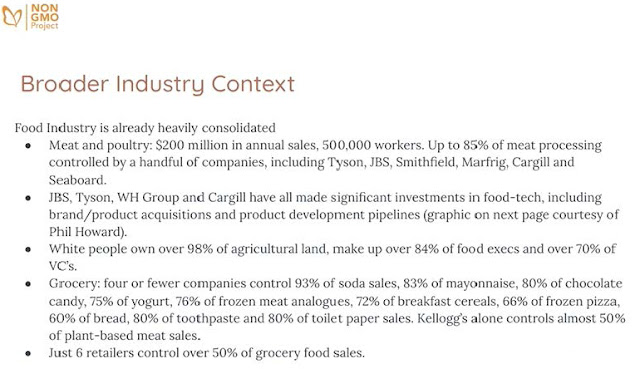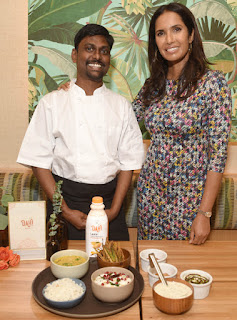Photo source: DAH!
I’m coming off of five days, four nights in New York City attending the Fancy Food Show, which included dining with actress and author Padma Lakshmi, who is the board advisor and brand partner for DAH! India Inspired Yogurt. This was followed by Marcum’s Food & Beverage Summit where “real” dairy innovation proved to be of high interest to many attendees and investors. And then, walking back to my hotel for a needed night’s rest before an early flight home, I spontaneously was gifted a 5th row ($250) ticket to see Sarah Jessica Parker and Matthew Broderick on Broadway in the remake of Neil Simon’s Plaza Suite. (I did not get that sleep.) Then the return to Chicago Thursday morning included almost four hours stuck on the tarmac at LaGuardia airport because of storms. On the plus side, I had an amazing pro-dairy conversation with my seat mates, followed by the very enlightening “How do you milk a microbe?” webinar from the non-GMO Project. Yes, I am exhausted.

Takeaways from the Fancy Food Show
It was wonderful to see so many of you at the Summer Fancy Food Show. The annual event, held June 12-14, marked a return following a two-year hiatus and featured more than 1,800 exhibiting companies. Please read THIS impressive summary of highlights from the show written by my Food Business News colleague Monica Watrous.
Topline: The specialty food market, which encompasses products with limited distribution, gourmet ingredients and elevated preparations, reached total sales of $175 billion in 2021, up 7.4% from the prior year, according to the Specialty Food Association. Dairy, in its many shapes and formats, is one of the largest sectors of the specialty food industry. Cheese, creamer and frozen desserts lead the way, with yogurt, butter and refrigerated desserts gaining traction.
The annual State of the Specialty Food Industry research presented at the Fancy Food Show included a closer look at specialty perishable sales, which are expected to reach nearly $33.5 billion in 2022. Perishables (random weight, non-UPC’d specialty items sold in a bakery, cheese, deli, meat and seafood sections) are critical to specialty, both in scale and as a good source of growth. For specialty retailers, perishables departments represent enticing, creative merchandising and execution. Plus, they are important centers for emerging food and beverage innovation that may eventually migrate to packaged goods categories.
After being challenged by shutdowns during COVID, perishables can expand to better meet consumers’ needs for hot, ready-to-eat, or take-home, heat-and-eat fresh meals; meal kits; sandwiches, side dishes and salads; breakfast foods; confections and desserts; and hot and cold beverages. Dairy’s presence in many of these concepts is strong.
The research also showed that BIPOC (black, indigenous and people of color)- and women-owned brands are in demand by consumers and retail buyers and foodservice operators are seeking out incubators, brokers, business-two-business wholesalers and distributors, and even sales consultancies that specialize in supporting and growing these brands. Showcasing these brands has moved far beyond seasonal features to align with observed months like Black History or Women’s History, and will continue to expand.
In case you missed Tuesday’s Daily Dose of Dairy—Painterland Sisters Skyr Icelandic-style Yogurt—here it is again. These sisters, their product and their mission speak to the specialty food consumer and the future of dairy. They remind me of the early days of Stonyfield yogurt. Their enthusiasm is contagious and should inspire us all.

Picture are the Painter sisters—Hayley and Stephanie—who grew up on a 4th-generation Pennsylvania family farm. Together the two are bringing to market whole milk organic skyr yogurt that they describes as “for your family’s health, for the future of family farms like ours, for the planet, for women in business and more.”
Made from whole milk, each 5.3-ounce cup packs in up to 18 grams of protein. The product is lactose free (through the addition of lactase) and delivers billions of probiotics, including BB12, the world’s most clinically documented Bifidobacterium probiotic strain. The yogurt is sweetened naturally using a touch of cane sugar and contains no fillers. The initial rollout is in five varieties: Blueberry Lemon, Mixed Berry, Strawberry and Vanilla Bean. The company uses ultra-filtered milk that is gently heated and minimally processed.
“We believe in regenerative farming, family togetherness, hard work, good food and simple living,” said Hayley at the Fancy Food Show. “When you buy organic skyr yogurt from Painterland Sisters, you don’t just get a healthy, delicious, convenient, sustainable snack, you join a sisterhood.”
My biggest take-away from the Fancy Food Show was also trending at the International Dairy Deli Bakery Association’s annual exposition the previous week. It’s terroir. From the word terre, meaning land, terroir is a French term that describes the most vital components in French food and drink production. It’s a reference to everything from the soil to climate to sunlight. It’s a description of the quality of the environment where a crop is grown, essentially, everything that makes up the surrounding habitat and gives it its unique character. The importance of terroir is most prevalent in the wine industry.
The Americanized version is most apparent with cheeses touting they are made from either California or Wisconsin milk. But our terroir twist includes animals and how they are raised. It also includes the story behind grains, nuts, seeds and produce. There’s a lot of opportunity in this space and it will continue to evolve as supply chain issues and food economics dominate conversations.

That’s a great lead into the webinar:
How Do You Milk a Microbe? With June being Dairy Month, the Non-GMO Project felt the time was right to bring “animal-free” dairy proteins into the spotlight. The organization, along with American dairy farmers, are concerned that many shoppers, food manufacturers and retailers are unaware that these “animal-free” dairy proteins are actually unlabeled and unregulated GMOs.
You can view the webinar
HERE.
“Synbio dairy products are GMOs because they are created by genetically engineering a microbe like yeast to excrete milk proteins,” said Megan Westgate, founder and executive director of the Non-GMO Project. “That’s the definition of unnatural.”

During the webinar she explained, “Any sincere conversation about food in the United States starts with an acknowledgment that our food system has been built on stolen land and slave labor. The colonial mindset behind these atrocities is still alive and well.
“That mindset is based on the misconception that somehow human beings are separate from nature and each other and the life is a resource to be extracted and manipulated,” she said. “And that’s the same mindset behind all genetic engineering and it is not going to get us out of the mess that human beings are in as a species at this moment in time on planet earth.”
Wow, this is powerful stuff and I encourage you to read more. She quoted Einstein:
“You can’t fix a problem with the same consciousness that created it.”

“Fortunately, we are part of nature and as such every single one of us has an innate capacity to remember how to belong to earth,” said Westgate.
She provided data that showed “consumers want products that are natural and not genetically modified. But it is becoming more challenging to provide those products because of the proliferation of new GMOs that are not being tracked or regulated.”
The non-GMO Project prohibits the use of synbio dairy, also often referred to as precision fermentation, in its verification process. The Project acknowledges that many of the companies developing these new GMOs have good intentions, such as climate change and animal welfare, but they don’t provide transparency. And, there are so many unknowns.

Synbio dairy could also put traditional dairy farmers and farmworkers out of business.
“GMOs pose a threat to the land, environment, and family farms, and I don’t think GMOs have a place in our farming and food system,” said Albert Straus, founder and CEO of Straus Family Creamery. “As the first Non-GMO Project Verified Creamery in North America, we are committed to organic farming.
“Organic farming practices protect the environment, address animal welfare, build soil health and provide nutritious food while revitalizing rural communities,” Strauss said. “Organic dairy farming and milk production are the foundation for a carbon-neutral dairy farming model that we’ll achieve on my farm by 2023.”

The speakers emphasized that there are “real and proven benefits of traditional, organic, regenerative dairy created in cooperation with nature.”
Alan Lewis, TEDx speaker, and head of government affairs and food and agriculture policy for Natural Grocers, said that almost all of the labs producing synbio dairy are private and funded by private investors. This leads to many secrets in the patents and allows companies to reveal only what they want revealed. He compared synbio dairy to the way Winston Churchill once described Russia: “a riddle, wrapped in a mystery, inside an enigma.”
Straus ended the webinar with something we must all remember and live by: “Livestock have an essential role in reducing climate change.”
Now, onto the few lighter moments this week. Thanks to my friends at DAH! for including me in the dinner at Semma Southern Indian in the West Village. The multi-course menu featured DAH!’s signature lassi probiotic-rich smoothie incorporated into dishes created by Chef Vijay Kumar (pictured with Padma Lakshmi). Her Hulu show--Taste of The Nation--just received a James Beard award this week, the day before she accepted three honors at the Critics’ Choice Awards.
And yes, I was a bit starstruck with Sarah and Matthew.
Dairy Innovators: Private Kitchen Pitch Contest presented by Midwest Dairy
The Hatchery Chicago has partnered with Midwest Dairy, a non-profit supporting farmers to highlight dairy products, to offer the Midwest Dairy Kitchen Pitch Contest. If you use 25% or more cow’s milk dairy in your ingredient base (made from a cow and can include milk, cheese, yogurt, butter, etc.), you are invited to apply. Applications opened June 1, 2022, and will close June 30, 2022, end of business day (5pm CST). The official rules are
HERE.
.jpg)
The Hatchery Chicago supports emerging brands with access to kitchen space and wrap-around services to support their business growth. Midwest Dairy represents 4,600 dairy farm families to 39 million consumers working on their member’s behalf to build dairy demand by inspiring consumer confidence in products and production practices. Midwest Dairy is funded by farmers across a 10-state region, including Minnesota, North Dakota, South Dakota, Nebraska, Iowa, Illinois, Missouri, Kansas, Arkansas, and eastern Oklahoma.
One winner will receive six months of free rent in one of The Hatchery’s private commercial kitchens along with other startup support. Apply
HERE.












.jpg)
No comments:
Post a Comment